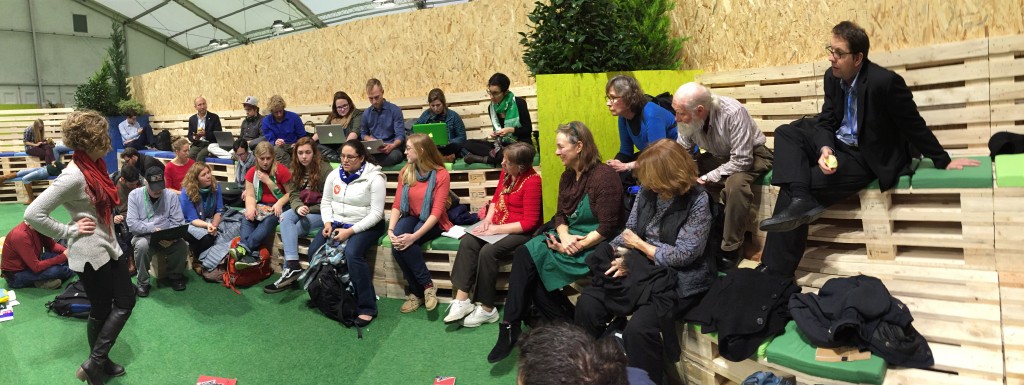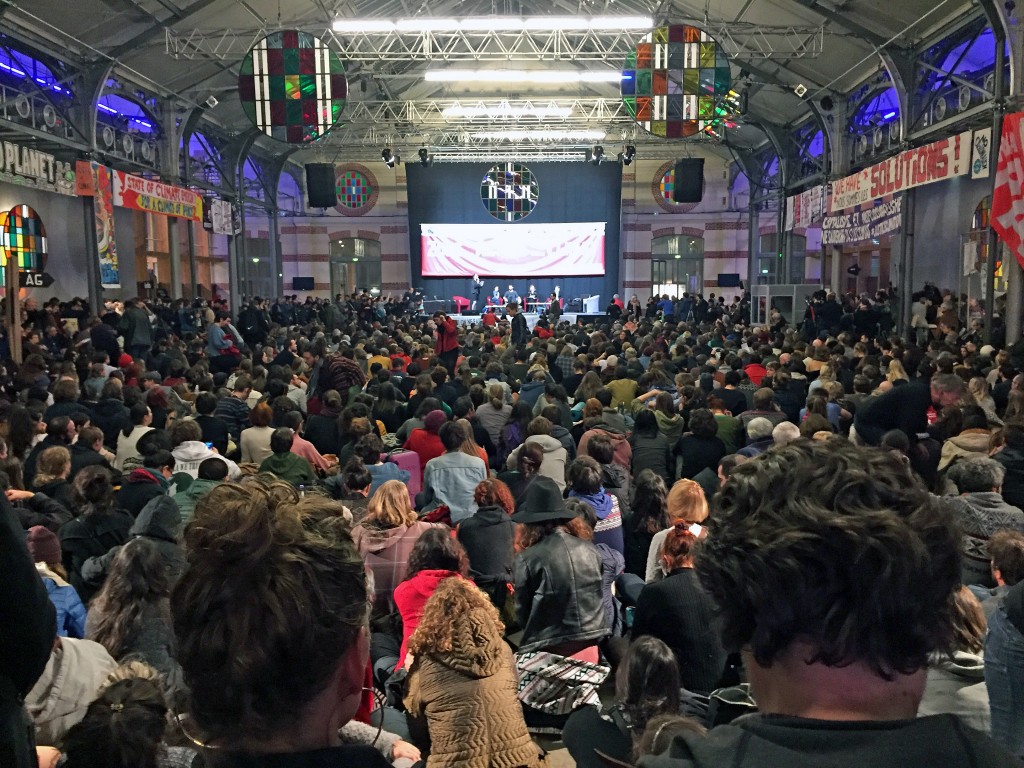As promised on Wednesday, new draft text for the agreement did come out yesterday, but not until 9 p.m. Thus, when Naomi Klein ended her event at Climate Action Zone last night by telling everyone to flood the streets on Saturday in defiance of French government plans to crack down on demonstrators, she was operating off the weak draft of the agreement released Wednesday. Yesterday’s version was a lot better — though climate activists are not cancelling their plans to flood the streets.

A series of equations related to the general circulation model of climate lines the train stop to Le Bourget at Gare du Nord in Paris.
Lisa Friedman of E&E News has a good rundown of the new draft, which apparently involved a long speech to negotiators by Secretary of State John Kerry:
- Ratcheting: This is the provision under which countries will agree to have their emissions targets reviewed and increased every five years. This has been something the United States and many environmental groups have insisted upon, while India and others have insisted that doing so must be voluntary for developing nations and come with the commitment of money. The current text includes some key elements the United States hopes to see, including potentially strong language ensuring that all countries move toward economywide emissions cuts. At the same time, it recognizes that “peaking will take longer for developing country parties.”
- Transparency: This is another issue dear to the heart of the U.S. negotiating team. State Department Special Envoy for Climate Change Todd Stern has called it “vital” that developing countries be asked to report their progress toward their emissions targets with as much rigor and frequency as rich countries. Today’s text leaves that still very much up in the air. Deutz said the biggest resistance there comes from India and China, which, like many other developing countries, are wary of intervention from abroad. “It’s a historic issue for China and also some countries with a colonial past. They jealously guard their sovereignty and domestic politics,” he said — though he also noted, “developed countries don’t really like other nations poking around in their business, either,” but have become comfortable with the U.N. system for reviewing emissions cuts.
- Temperature target: In a big win for island nations, the new text now calls for holding the global average temperature increase to “well below 2 degrees Celsius above pre-industrial levels and to pursue efforts to limit the temperature increase to 1.5C.” Scientists say it will be tremendously difficult to meet that goal, but the most vulnerable nations said the deal must at minimum recognize it as an aspiration. “With this, I would be able to go home and tell my people that our chance for survival is not lost,” Marshall Islands Foreign Minister Tony de Brum said.
- Legally binding: In a surprising move, the final text makes no mention of either internationally binding emissions pledges or a demand to implement policies to see those targets through. That’s another win for the United States, which is trying to avoid the need for Senate approval. Rather than requiring that countries make good on their pledges, it states only that intended nationally determined contributions “shall be recorded in a public registry maintained by the secretariat.” European and American activists described the language as a major concession on the part of the European Union, which had sought binding commitments as a means of guaranteeing that promised reductions would happen.
Again negotiators stayed up most of the night to get to this draft of the agreement, and they are promising to release final text tomorrow (Saturday), which means they met at 5:30 a.m. today to start the final round of negotiations. To think the fate of the world rests on the shoulders of people who have had practically no sleep for three days …
Today was my last full day in Paris. Tomorrow I have to catch the shuttle at 7:15 a.m. to head to the airport for a 10:30 a.m. flight. I was debating whether to use the day to go back to the Climate Action Zone or to Climate Generations, but the decision was made for me when the Sierra Club sent out a message that its final gathering would take place at 4 p.m. at Climate Generations. I enjoyed a leisurely lunch while catching up on COP news and then headed over.
At the Sierra Club gathering, we heard from Fred Heutte and John Coequyt of the Federal and International Climate Campaign, who have been inside the negotiations the entire time. They stressed that the Sierra Club really likes most of the agreement. Points they like include five-year cycles for national commitments starting in 2020, goal of greenhouse gas neutrality in the second half of the century, a target of 1.5 degrees C referenced in Article 2, global stocktaking for mitigation and finance every five years starting in 2023, and a floor of $100 billion in climate financing per year with cycles of review. Parts of the agreement they do not like are the just transition only in the preamble, not the body of the agreement, and transparency and verification still in flux.
Coequyt said the Sierra Club would be using positive messaging to talk about the agreement, even though other groups may use a negative frame. The reason for this, he said, is that these groups have different audiences. The Sierra Club’s audience is mainly Americans who we need to support this agreement. Many aspects, especially the incorporation of the 1.5 C target, are above and beyond what anyone expected, though he noted that scientific integrity calls for us to clarify that humans will most likely overshoot 1.5 C (1.4 C is already locked in) and then have to bring it back down. Other groups, especially those representing climate vulnerable populations, Coequyt said, would frame it negatively because they want to pressure countries of the world to do more. This explanation really helped me understand why there are such wildly varying frames of the same agreement.
After the meeting, I headed with Glen Besa and Tyla Matteson to the Fondacion des Etats-Unis to see a theatrical reading of a play called “Extreme Whether” by Karen Malpede, based in part on the work of climate scientists James Hansen and Jennifer Francis (though they are not in a relationship in real life). Here’s the summary:
 Extreme Whether poses a bitter debate over the future of the planet but becomes a meditation on the sublime in nature. Written in a mix of prose and poetry, with invective, humor and a full musical score, Extreme Whether sets the battle over global warming within a single family as a challenge to the American family at this moment of ecological crisis.
Extreme Whether poses a bitter debate over the future of the planet but becomes a meditation on the sublime in nature. Written in a mix of prose and poetry, with invective, humor and a full musical score, Extreme Whether sets the battle over global warming within a single family as a challenge to the American family at this moment of ecological crisis.
A major climate scientist, his colleague and lover, an Arctic scientist, wage fierce battle with his twin sister, a publicist for the energy industry, and her husband, a lobbyist, over scientific truth and an inherited wilderness estate. His wise-child daughter and her side-kick Uncle work to protect the natural world and sabotage its abusers.
As it happened, one of my roommates at Place to B was in this play. I had heard about it while scouting out events to attend before my trip, and she told me that she was acting in a play here when she first checked in this week, but I didn’t put it together that this was the play she was in until today. The reading was excellent even without the normal props and costumes in a full production. If you ever have a chance to see this, go. Here’s a good review.
After the play, I headed over to Piscine Pontoise for a swim. My flight to Paris had been miserable in part because I hadn’t gotten in a workout before going, and I wanted the flight back to be easier. Swimming meant that I had to skip a special appearance by Amy Goodman at Place to B. I was hoping it would be recorded, and fortunately it was. You can join me in watching it here:







